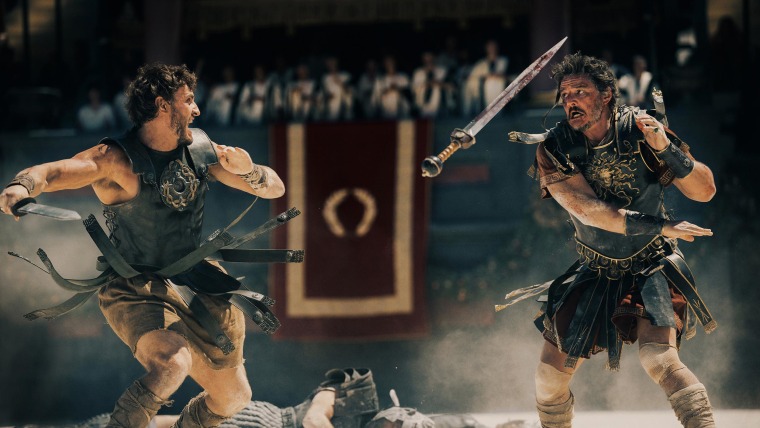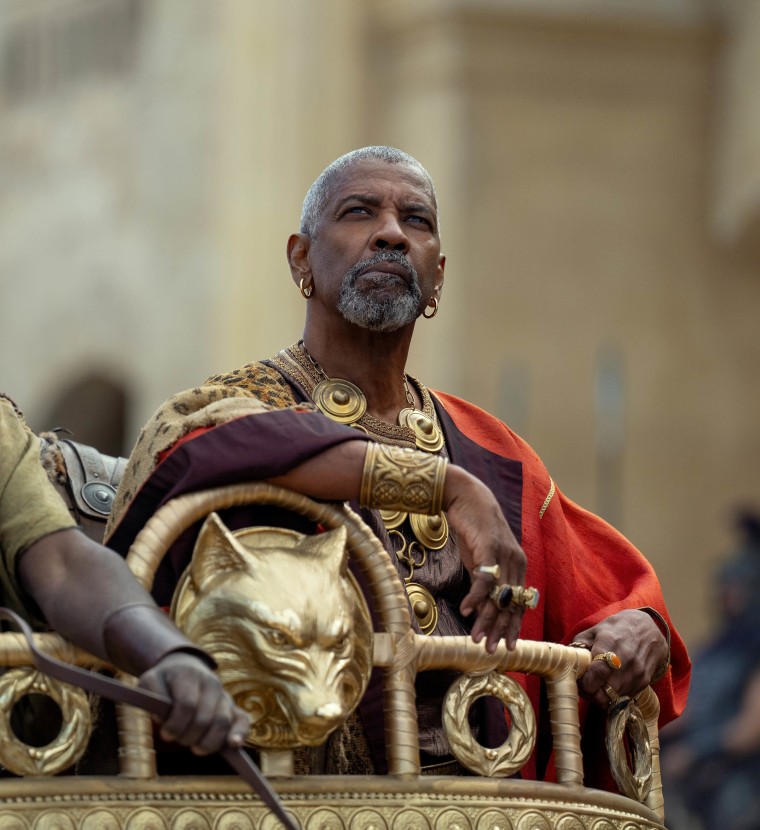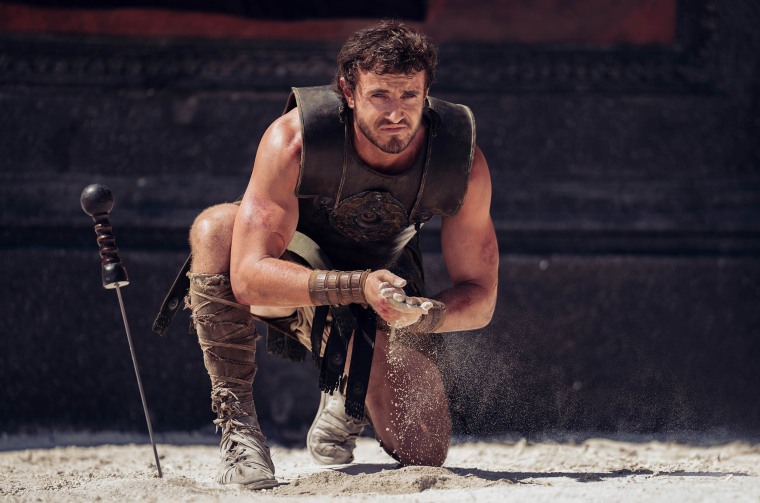Warning: This post contains spoilers for “Gladiator II.”
Very few people are left standing by the end of “Gladiator II.”
The long anticipated sequel to Ridley Scott’s 2000 film “Gladiator” premiered in theaters on Nov. 22, starring Paul Mescal as Lucius, the exiled son of Maximus and Lucilla from the original movie, and Pedro Pascal as General Marcus Acacius.
Connie Nielsen, who plays Lucilla in the original film and in the sequel, spoke to TODAY’s Hoda Kotb and Jenna Bush Hager alongside Mescal on Nov. 22 about returning to the role, more than two decades after the first movie was released.
“It was magic, it was moving, it was so strange. It was a little bit like coming home to something,” Nielson said. “And at the same time, I wasn’t going back in time — I was where Lucilla would have been, 20 years later in her life, and telling that story about what happened to her.”
As in the first “Gladiator” film, the sequel is filled with gory bloodbaths and epic battle sequences. But who emerges victorious in the Roman Colosseum? Keep reading for a full explanation of the ending of “Gladiator II.”

How does ‘Gladiator II’ begin?
In the sequel, a now-adult Lucius is taken prisoner after Acacius takes siege over the city he was taken to as a child, years after Lucius’ mother dispelled him from Rome over concerns for his safety once his father Maximus was killed in the first film.
After being captured, Lucius and several other prisoners are sent into the Colosseum where they are forced to fend off a pack of feral baboons — or die.
“That sequence is absolutely insane, almost unfathomable when you see it,” Mescal said, according to the film’s press notes. “He is taken prisoner and dragged into Rome. He has an intense anger towards everything Roman that will grow as the film progresses.”
“When he enters the arena for the first time, he sees Acacius, the general who led the siege of his city and was responsible for killing his wife. He sees him sitting there with his own wife and he vows to himself to kill them or be killed,” Mescal continues.
Lucius soon realizes the heavy implication of that vow. Acacius’ wife, played by Connie Nielsen, is his mother — and no one appears to remember his true identity.
Lucius’ performance against the baboons in the Colosseum catches the attention of Denzel Washington’s character Macrinus, who teases Lucius with an opportunity at freedom and a chance to face Acacius.

But before those things can happen, Macrinus, an astute Roman businessman with great wealth and connections across the empire, forces Lucius to become his gladiator in order to repay him and earn his freedom.
Viewers soon find out that Macrinus has ulterior motives — including toppling the twin emperors Geta and Caracalla, played by Joseph Quinn and Fred Hechinger, respectively.
“Lucius is a natural-born leader and a great fighter, which makes him useful in many ways. But pure rage is not a tool; it’s a disadvantage. Macrinus never wants to lose control. He doesn’t want to be the emperor. He wants to control the emperor,” Washington said, according to the press notes.
“And power is an addictive drug. Once you have it, you can’t live without it. Once he had a taste for taking, he had to have more. He doesn’t really care about anyone. He uses them. If people can’t make him more powerful, he has no interest in them,” he added.
How does ‘Gladiator II’ end?
An attempted coup led by Acacius marks the beginning of the end in “Gladiator II.”
Pascal notes that Acacius’ allegiances in film are strategic.
“Because he is leading the Roman army, you’ll think he’s a villain,” Pascal said of his character in the film’s press notes. “But Acacius loves Lucilla, a beloved character from the first movie. So, then he’s a good guy. And the movie plays those tricks on us continually.”
Acacius attempts to take over the government from the twin emperors, but Macrinus learns of his plan through his connections throughout the empire and thwarts it.
The general is then thrown into the Colosseum as punishment and ordered to fight Lucius in front of the emperors and scores of Roman citizens. Though Lucius has previously vowed to kill Acacius to avenge the killing of his wife, he ultimately decides not to kill him in the arena, which angers Geta and Caracalla.
The emperors order for the guards to kill Acacius, and several soldiers shoot him to death with arrows sent flying from across the arena. The crowd hates the decision — hinting at another uprising.
The death of Acacius destabilizes the emperors’ reign, which Macrinus capitalizes on. He begins plotting to turn the twin brothers against each other, and focuses on Caracalla’s insecurity as the weaker leader. He convinces him to kill his own brother, and during the murder, Macrinus even helps him cut off Geta’s head.
An obvious nod to his instability, Caracalla appoints his pet monkey as first consul, but appoints Macrinus as his second consul, giving the businessman sweeping authority over the empire.
Meanwhile, Lucius hears that his mother is set to be executed for her role in the attempted coup and decides to finally accept his destiny as a leader in Rome.

He sends a messenger (along with a ring belonging to his father given to him by Lucilla) to a group of Acacius’ soldiers gathered outside of Rome. His plan? To rally his fellow gladiators to try to stop his mother’s execution and use the Acacius’ soldiers to take back the city.
As Lucilla is brought out into the Colosseum to be executed, the gladiators overpower the guards, but not before Macrinus manages to shoot Lucilla in the chest with an arrow. He then rides out of the Colosseum to gather his own army to fight against the Acacius’ soldiers.
Lucius chases him, and the pair face off in an epic battle on the outskirts of town with their two armies watching. Lucius wins the battle, cutting off Macrinus’ arm and killing him in a river. He then gives an inspiring speech to the soldiers about rebuilding Rome, just as his father Maximus would have wanted.
In the film’s final scene, Lucius returns to the Colosseum and picks up some of the dirt, an obvious homage to the first film. A brief clip, which appears to be from the original film, then plays and shows a hand touching wheat in a field, a moment symbolic of one passing through to the afterlife.